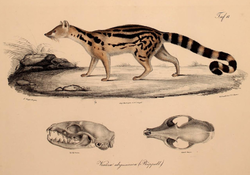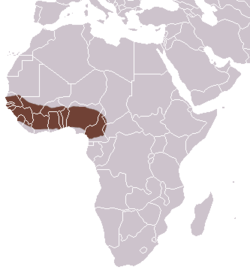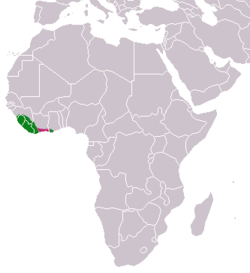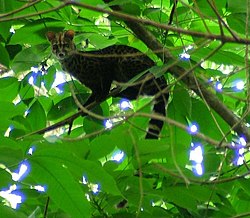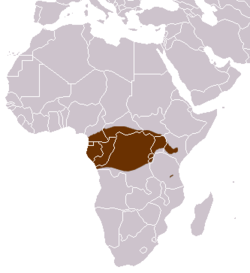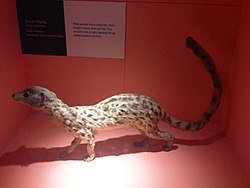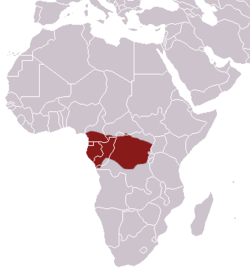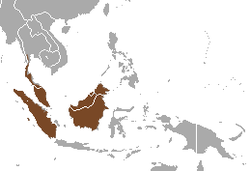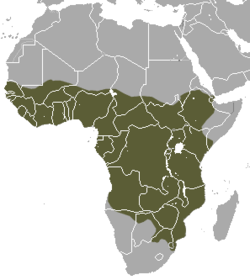Top Qs
Timeline
Chat
Perspective
List of viverrids
Species in the mammal family Viverridae From Wikipedia, the free encyclopedia
Remove ads
Viverridae is a family of mammals in the order Carnivora, composed mainly of the civets and genets. A member of this family is called a viverrid. They are widespread primarily throughout Africa, India, and southeast Asia, and are found primarily in forests, shrublands, and grasslands, though some species can be found in savannas or wetlands. Most viverrids are 40 to 65 cm (16 to 26 in) long, plus a 35 to 60 cm (14 to 24 in) tail, though the West African oyan can be as small as 30 cm (12 in) plus a 35 cm (14 in) tail, and some binturongs can be up to 96 cm (38 in) plus a 89 cm (35 in) tail. Most species do not have population estimates, though three viverrids are classified as endangered, and one, the Malabar large-spotted civet, is classified as critically endangered with a population size of around 200. No viverrid species have been domesticated.

The thirty-three species of Viverridae are split into fourteen genera within four subfamilies: the three civet subfamilies Viverrinae, Hemigalinae, and Paradoxurinae, and the genet subfamily Genettinae. A fifth subfamily, Prionodontinae, was previously included in Viverridae, while the species in Genettinae were considered part of Viverrinae, but more recent genetic evidence resulted in the consensus to separate Prionodontinae into its own family and split out Genettinae into its own subfamily. Extinct species have also been placed into Viverrinae, as well as the extinct subfamily Lophocyoninae, though most extinct species have not been categorized into a subfamily. Nearly twenty extinct Viverridae species have been discovered, though due to ongoing research and discoveries the exact number and categorization is not fixed.
Remove ads
Conventions
The author citation for the species or genus is given after the scientific name; parentheses around the author citation indicate that this was not the original taxonomic placement. Conservation status codes listed follow the International Union for Conservation of Nature (IUCN) Red List of Threatened Species. Range maps are provided wherever possible; if a range map is not available, a description of the viverrid's range is provided. Ranges are based on the IUCN Red List for that species unless otherwise noted.
Remove ads
Classification
The family Viverridae consists of 33 extant species belonging to 14 genera in 4 subfamilies and divided into dozens of extant subspecies. This does not include hybrid species or extinct prehistoric species.
- Subfamily Genettinae
- Subfamily Hemigalinae
- Genus Chrotogale: one species
- Genus Cynogale: one species
- Genus Diplogale: one species
- Genus Hemigalus: one species
- Subfamily Paradoxurinae
- Genus Arctictis: one species
- Genus Arctogalidia: one species
- Genus Macrogalidia: one species
- Genus Paguma: one species
- Genus Paradoxurus: three species
- Subfamily Viverrinae
- Genus Civettictis: one species
- Genus Viverra: four species
- Genus Viverricula: one species
Remove ads
Viverrids
Summarize
Perspective
The following classification is based on the taxonomy described by Mammal Species of the World (2005), with augmentation by generally accepted proposals made since using molecular phylogenetic analysis. This includes the promotion of the Prionodontinae subfamily into its own family, and the moving of the Poiana and Genetta genera out of the Viverrinae subfamily into their own Genettinae subfamily. There are several additional proposals which are disputed, such as splitting the golden palm civet into three species or adding three additional species to Genetta, which are not included here.[1][2]
Subfamily Genettinae
Subfamily Hemigalinae
Subfamily Paradoxurinae
Subfamily Viverrinae
Remove ads
References
Wikiwand - on
Seamless Wikipedia browsing. On steroids.
Remove ads

